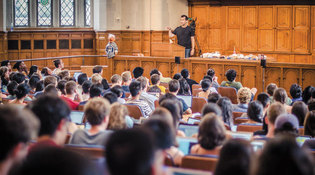 loading
loading
Light & VerityCome for the cake, stay for the codingA popular computer science course—imported from Harvard.  Philipp Arndt ’16Harvard computer science professor David Malan (with puppet) addresses a CS50 class in the Law School's Levinson Auditorium. Malan more often appeared on a video screen, speaking from Cambridge. View full imageOfficially, it’s listed at Yale as Computer Science 100, Introduction to Computing and Programming. But nearly everybody calls it CS50, the number assigned to the course where it originated—Harvard. By any name, it has been a sensation at both schools. The brainchild of Harvard professor David Malan, the course aims to provide a comprehensive primer for those who might have otherwise considered computer science to be either inaccessible or irrelevant to their studies. First taught in Cambridge in the fall of 2007, the course had an enrollment of 889 students by the fall of 2014. Yale’s computer science department arranged to have the course taught concurrently last fall in New Haven, with most of the lectures beamed in by video from Cambridge but with Yale teaching assistants and sections on campus. The course’s reputation preceded it, and, attracted by promises of an engaging course format—and free cake for the first two weeks—510 undergraduates enrolled last fall, making it Yale’s most popular course. The course’s popularity speaks to a rapidly growing interest in programming among undergraduates at liberal arts institutions. For Michael Berry ’17, a psychology major, CS50 struck the right balance between accessibility and practicality. “It seemed like it might be a fun way to learn a thing or two about programming,” says Berry. Yale computer science professor Brian Scassellati, the primary instructor of CS50 in New Haven, believes that all undergraduates should at least be exposed to the basics of computer science. “Every aspect of our society today, from how we connect to family and friends to the tools that we use to compose, to write, and to analyze, has been impacted by computation,” says Scassellati. Beyond providing an avenue for students to learn about computing and programming, CS50 also allows students the opportunity to teach and mentor their peers. Over 40 undergraduates were hired as teaching assistants to hold structured office hours, answer questions in the online forum, and offer support in the form of friendly, available faces. “Undergraduate TAs were able to provide the course with the intimacy that has defined the student-first culture of CS50,” says head teaching assistant Andi Peng ’18. The course was not, as it turned out, for everyone. Enrollment dropped from 510 to 448 after the first few weeks; some students were put off by the amount of work involved, and at least one complained that the course’s methods were “gimmicky.” (Puppets, stress balls, and other unusual teaching aids have made appearances.) But reviews were mainly positive, and Yale plans to offer the course in 2017 and 2018. Will it help narrow the gap between those who code and those who don’t? Computer science major and teaching assistant Alex Reinking ’16 thinks it can’t hurt. “Even if CS50 isn’t the answer,” says Reinking, “I’d say it’s a pretty good one.”
|
|
2 comments
-

Mohammad Mahdi Nehme , 12:37am March 18 2016 |  Flag as inappropriate
Flag as inappropriate
-

MIkael, 8:27am March 18 2016 |  Flag as inappropriate
Flag as inappropriate
The comment period has expired.Interesting article, I i hope i could manage to enroll in this awesome course one day.
Mohammad Mahdi, you can access all materials via cs50.tv or enroll in the course via edX.org